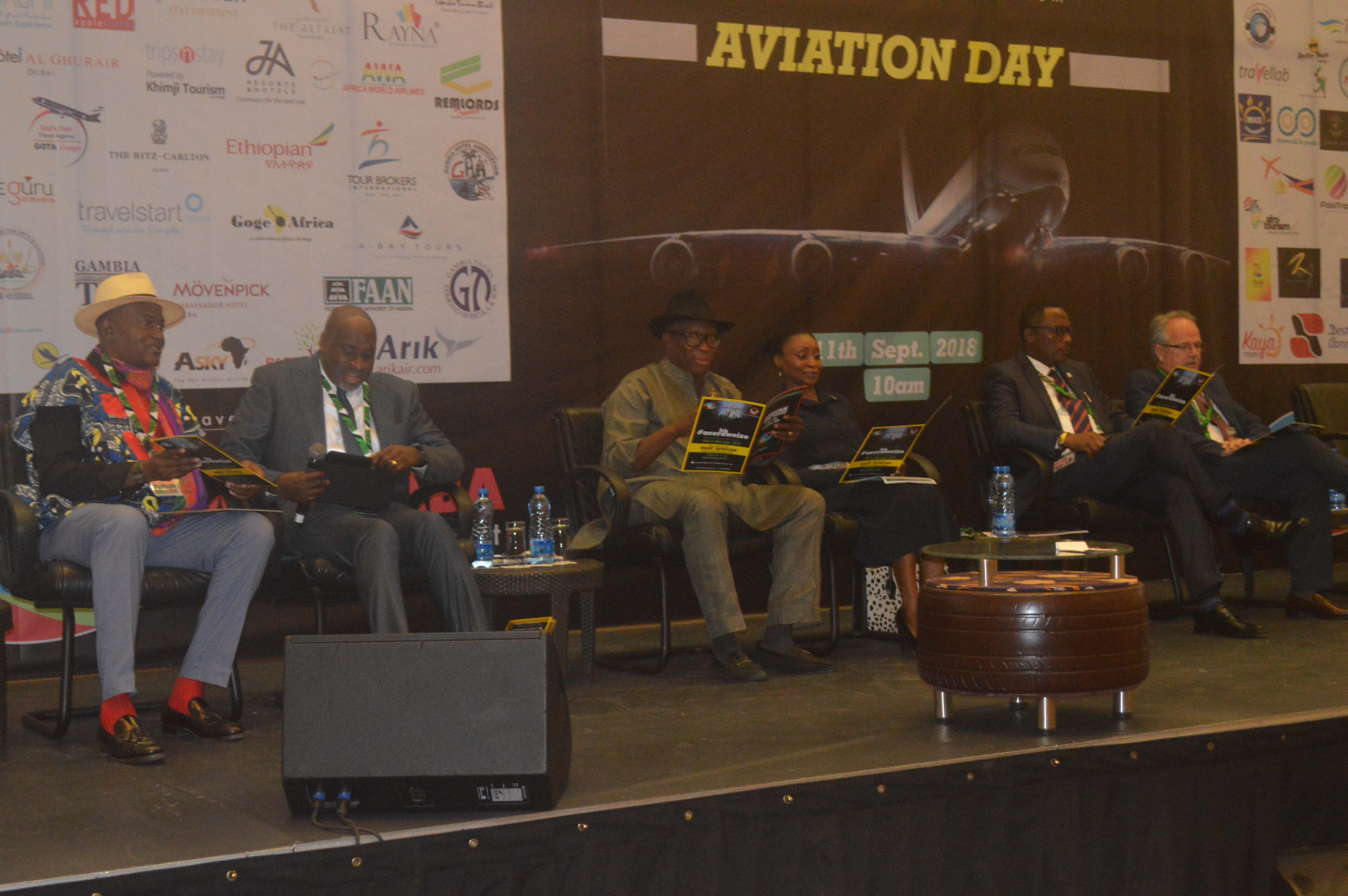
Last week aviation industry stakeholders debated why Nigerian airlines have short life span and identified factors responsible. Writer takes a look at the factors and the way out.
Last week industry stakeholders met in Lagos to deliberate on factors responsible for short lifespan of Nigerian airlines and how to open the industry for potential growth.
The meeting was organised by Aviation Round Table Initiative (ART), a think-tank body in the industry that x-rays issues that affect the sector.
The stakeholders noted that Nigerian airlines have average 10 years lifespan and there are myriads of factors that contribute to their collapse within a short period of time but chief among these factors is lack of corporate governance.
Vacuum
The President of ART and also the President and Chief Executive Officer, Sabre Network NMC, West Africa Gbenga Olowo said that the domestic carriers lack corporate governance and suffer from owner-manager syndrome, which gives rise to unprofessional decisions that eventually kill the airlines.
He noted that despite the deregulation of the industry in mid 1980s which opened the market to privately owned commercial airlines and over 40 years down the line there is still a vacuum, as domestic carriers have been unable to compete with their international counterparts. This, he noted, has created the lopsided situation whereby only foreign carriers airlift Nigerian passengers to international destinations and cart away their revenue in never ending capital flight from the sector.
He said that it was this vacuum that prompted the federal government to start the failed attempt to have another national carrier.
“The announcement of Nigeria Air in the last three years of President Buhari shook the industry. That announcement was a vote of no confidence on the sector, that the airlines that are existing are not doing well. And three years after we suddenly learnt that project is being suspended and that made all of us to start speculating why, how, what happened and we will continue to speculate until we hear exactly what happened. I will say that it destabilised the sector because in planning with the Nigerian airlines in the last three years, they would factor in that announcement. If I were to be the managing director of a Nigerian airline, I would factor in the arrival of a very strong competitor,” he said.
Olowo challenged the federal government to come out and tell Nigerians whether the project was only suspended or it would be resuscitated. Project Nigeria Air was suspended in September after a Federal Executive Council (FEC) meeting where no actual reasons for the suspension have been given, other than statements from Minister of State, Hadi Sirika.

Fly Nigeria Act
Olowo equally advised the Airline Operators of Nigeria (AON) to go and pursue the Fly Nigeria Act so as to increase their revenue generation.
“AON should go and put up the Flight Nigeria Act Bill so as to make gains. Your costs are so much and you can’t control them. The only way is to increase your revenue by pursuing the Fly Nigeria Act”, Olowo said”
Policy Summersault
Speaking on behalf of the airlines at the event the Chief Executive Officer of Overland Airways, Captain Edward Boyo said policy summersault of government is behind the reason why airlines do not thrive for long in Nigeria.
Boyo also identified the harsh operating environment, inadequate and obsolete airport infrastructure, high prices and sometimes non-availability of aviation fuel and high taxes as some of the problems airline operators face in Nigeria, which undermine their success and profitability.
He said that for Nigerian airlines to operate at a profit level, they need to charge air travellers at least $200 (about N70, 000) for one-way ticket.
He further said that the country’s environment does not encourage acquisition of new aircraft, stressing that airline operators pay about 30 per cent interest on loans obtained from banks while their counterparts in Europe and America pay back with single digit interest rate.
Boyo remarked that the travelling public in the country want cheap flights and top-notch services at the expense of the operating airlines, saying that until all the challenges inhibiting growth in the sub-sector were addressed, aviation industry in Nigeria would continue to lag behind.
He emphasised that no airline was set to intentionally delay or cancel flights, noting that infrastructure decay at airports and stations contributed, in no small measures, to their unstable operations.
Boyo also identified scarcity of aviation fuel especially in Abuja, single runway at the Abuja airport and VIP movements as some of the reasons the airlines delay or cancel flights.
He also said that the age of aircraft does not affect its operations, rather its maintenance matter for its continuous airworthiness.
“No airline in this country or anywhere in the world is set out to delay passengers, but the operating environment is hostile to our operations. Until a minimum of an hour flights starts from $200, then, we will not last.
“As long as the aircraft is airworthy, it is good to fly. Airlines today suffer too much regulation from the Nigerian Civil Aviation Authority (NCAA). The age of an aircraft is measured in circle and hours. The key thing is for an aircraft to be airworthy. The Nigerian environment does not encourage Nigerian airlines to acquire new aircraft. The loans we obtain are repaid back at about 30 per cent interest rate,” he said.
Corporate Governance
Also speaking on the topic: “The Importance of Corporate Governance”, the Director General/CEO, Institute of Directors Nigeria (IoD), Victor Banjo linked failures in airline business to poor corporate governance and high incidence of fraud and corruption which he said were the bane of airline operation in Nigeria.
According to him, corporate governance provides the controls and discipline operators need and that adoption of corporate governance practices promote effective leadership and corporate sustainability,
He said that controls and discipline can moderate the desire for excessive profit which leads to unethical practices and fraudulent acts,
“Good corporate governance thrives when you have a rationalised policy determination process. This is only achievable when we have clear sighted political leaders who are committed to the development of Nigeria as opposed to sectional and parochial interests. Ethiopia, Namibia, Rwanda, Cote D’Ivoire, Togo, Ghana and Senegal are getting it right in terms of airline management and airport infrastructure, as with other areas of human endeavour. What is stopping us?”

Banjo noted that in other parts of the world, airlines struggle but not within a life span of five to eight years as recorded in Nigeria, stressing that corporate governance is very important to the management of airlines.
On the planned Nigeria Air that was recently suspended, Banjo said that government should have appointed directors for the carrier but this was not put in place before it collapsed. He therefore advised that Nigerian government should concentrate on creating good business environment for airline operators in the country instead of trying to float a national carrier.
In his remark, Chairman of the occasion and Director of Studies, Centre for International Advanced and Professional Studies, Prof. Anthony Kila said that Nigeria Air was conceived on power point, shared on Adobe and died on Twitter”.
According to Kila, the Nigeria Air project was embarked on without due consultation and communication with people that matters, adding that there was no industry engagement and when a project is done like that it is bound to die.
National Carrier
Chief Executive Officer of Belujane Konsult Limited, Chris Aligbe described the suspension of Nigeria Air as a bad decision and said that the suspension has painted a bleak future for the aviation industry.
“Hope is bleak if we don’t have national carrier. The question is not ego but what is the future of our children. We are also looking at what we going to provide for them. The problem with Nigeria Air is poor communication management. I don’t think Nigeria Air is dead, it is not dead.”
Aligbe said the national carrier, if carried through, would have become the fulcrum for the growth of airline business in Nigeria and expressed the hope that the federal government would restart the process in the near future.
Honouring Agreements
Another factor the experts identified as the reason why the aviation industry has not developed is that international investors are reluctant to invest in the aviation industry due to the failure of the Nigerian government to honour agreements.
Former Managing Director of Virgin Nigeria Airways (VNA), Captain Dapo Olumide lamented the inability of government to honour agreements in the aviation industry and recalled that when VNA was established it was agreed between the federal government and major investor in the Nigerian airline, Richard Branson, that the airline would operate both its domestic and international services from the international terminal of the Murtala Muhammed Airport, Lagos.
Olumide noted that this agreement was repudiated by the government and frustrated the airline from building operational hub in Nigeria to bring in passengers from all over the world and distribute them to other West African destinations through the Lagos airport.
CEO of Maevis Limited, Tunde Fagbemi said the corporate governance is inherent in good business but noted that this does not mean that a family cannot run a business and strictly observe corporate governance in the running of the business.
He commended NCAA for the safety so far recorded in the industry, as no major incident or accident has happened involving commercial airliner in Nigeria since 2013.
Fagbemi said, however, that Nigerian airlines must return to buying new aircraft which costs less in maintenance, has state-of-the-art equipment that with modern navigational aids and also is fuel efficient.
He said for lessors to lease aircraft to Nigerian airlines there must be enabling environment, including honouring leasing agreements by the airlines.
“We must return to buying new aircraft because it is fuel efficient, it has state-of-the-art equipment and it cost less to operate. I thank the Director General of NCAA for strict observance to Cape Town Convention (which stipulates that when leasing agreement between the airline and the lessor is not followed by the airline that leased the aircraft, the regulatory authority should intervene.) without enabling environment, no lessor can give you new aircraft,” Fagbemi said.
THISDAY






